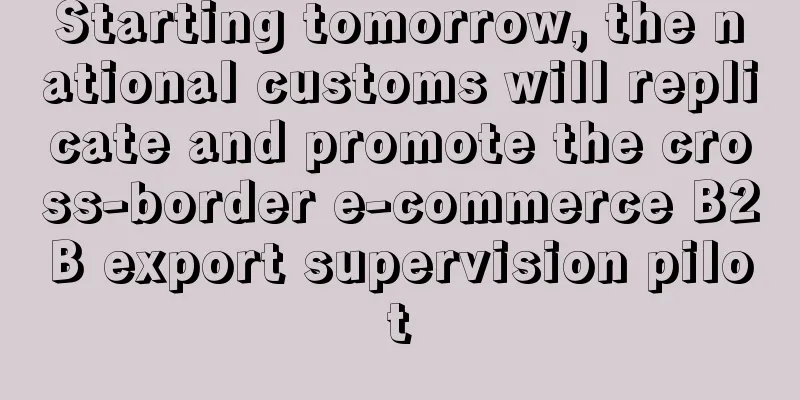Starting tomorrow, the national customs will replicate and promote the cross-border e-commerce B2B export supervision pilot

|
According to the document previously released by the General Administration of Customs, starting tomorrow, customs across the country will implement the replication and promotion of the cross-border e-commerce B2B export pilot project in accordance with regulations. The document mentioned that this is an important decision made by the country based on deepening the "delegation, regulation and service" policy and effectively promoting the healthy growth of cross-border e-commerce. The targets include: cross-border e-commerce companies, cross-border e-commerce platform companies, logistics companies and other domestic companies involved in B2B export cross-border e-commerce business. According to regulations, the monitored objects must be registered with the local customs unit in a timely manner.
When it comes to China's cross-border e-commerce pilot work, everyone can have a preliminary understanding of the development history of China's cross-border e-commerce pilot work: China's cross-border e-commerce pilot work was launched in May 2012; in December of the same year, Zhengzhou, Shanghai, Chongqing, Ningbo and Hangzhou became the first batch of pilot cities; in September 2013 and at the end of the year, Guangzhou and Shenzhen were successively included in the pilot cities; in July 2014, the General Administration of Customs issued a document to clarify the legal status of cross-border import e-commerce, and since then, cross-border e-commerce has sprung up like mushrooms after rain.
At present, the development status of cross-border e-commerce in my country is mainly as follows: most sellers are concentrated in coastal areas and a small number of inland areas; the development model is in a state of each operating independently; risk control is weak, management is decentralized, the operation system is not yet sound, and there is insufficient understanding of foreign policies. Just like this year, many sellers in cross-border e-commerce have encountered multiple crises such as property rights disputes, account suspension, and even suspension due to trademark rights, improper operation, lack of talent, etc., which has caused instability in the development of the industry.
With the replication and promotion from the pilot project to the whole country, it shows that the country has further clarified the legal status of cross-border e-commerce. With the full implementation of the pilot project, the development of cross-border e-commerce will also usher in a new opportunity to break the regional imbalance in its development and the problems of poor information sharing, and provide solutions to many of the above-mentioned problems, such as strengthening talent training, property rights protection, scientific operations, and import and export regulations.
Cross-border e-commerce is a vital force in my country's new economic form. While we support and encourage it, we will never let it develop arbitrarily. The ultimate goal is to work together with policy support and supervision to ensure its scientific and healthy development. |
Recommend
Sellers' Quick Look: Four Strategies to Stimulate Customer Repurchase
It’s no secret that it costs more to acquire a ne...
What is Dia&Co? Dia&Co Review, Features
Founded in 2015, Dia&Co is a plus-size women&...
What is Girlfriend Collective? Girlfriend Collective Review, Features
Girlfriend Collective is an online sales website f...
With monthly sales exceeding 30 million, the smart home brand received 50 million in financing
In the first half of 2021, affected by the epidem...
Amazon closes another distribution center in the United States
According to foreign media reports, Amazon plans ...
What is Kerry Logistics (formerly Yanzhao Logistics)? Kerry Logistics (formerly Yanzhao Logistics) Review, Features
Henan Kairui Logistics Co., Ltd. (formerly Yanzha...
German electronics retailer MediaMarkt expands into Türkiye as online sales grow 400%
It is reported that Media Markt's online sale...
Etsy steps up promotion of "celebrity sellers"
Currently, many platforms have begun to promote &...
Taobao remains the top platform for wine live streaming, and Tmall's Double 11 wine live streaming grew by 628%
On November 10, Tmall's Double 11 wine live b...
The scale may reach 25 trillion won! South Korea's health care products market is booming
According to statistics, the size of South Korea&...
Japan Post will implement special EMS surcharges on June 1, 2021
On April 15, Japan Post Co., Ltd. announced that ...
The Philippines is in emergency lockdown, logistics are in crisis, sellers should beware of container goods being auctioned off!
Philippines imposes one-month entry ban According...
6 products are hot-selling on Amazon, and Shenzhen's best seller has received tens of millions in financing!
Recently, smart hardware company Jihai Technology...
Lazada and Grab partner to launch same-day delivery service
Recently, according to foreign media reports, Laz...
Salary from 10,000 to 5,000! Amazon operations staff says it's hard to change careers
There is less than a month left before the Chines...









